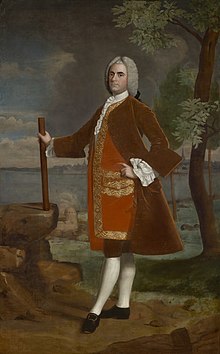Samuel Waldo

Samuel Waldo (born December 22, 1696 in England , † May 23, 1759 in Bangor , Maine ) was an American trader, land speculator, brigade general in King George's War and a politician of the Province of Massachusetts Bay .
Life
Samuel Waldo was born in 1696 in England to the merchant Jonathan Waldo, also von Waldow , and Hannah Mason. The family moved to Boston , Massachusetts in 1700 . There he attended the Boston Latin School and also learned German from his mother. In 1722 he married Lucy Wainwright, with whom he had six children.
Waldo left Boston Latin School at age 18 and worked in his father's office. He then ran a trading business with his brother Cornelius Waldo, which took him to Europe and the West Indies. After studying at Harvard, he went to Germany and joined the guard of Elector Georg Ludwig , later King George I of England , in Hanover . He received military training and went to London with him. When his father died, Waldo went back to Boston and took over his father's trading business. Thanks to his military training, he was promoted to Colonel in the militia .
Waldo patent
It was through his father that Waldo came into contact with the Muscungus patent , a grant given on March 2, 1629 by the Plymouth Council to John Beauchamp of London and Thomas Leverett of Boston. This grant covered an area which today roughly makes up the state of Maine. After Beauchamp's death in 1714, the patent went to John Leverett, heir to Thomas Leverett and President of Harvard College. He divided the land into ten shares and transferred it to ten people. They had twenty partners. When in 1726 David Dunbar claimed all the big pines for the British Navy, Samuel Waldo was sent to London as a negotiator. His negotiations were successful and on his return the ten owners transferred part of the grant to him. He later acquired more, so that the Grant Waldo patent was named after him . Waldo had Scottish-Irish and German families settle in the area from 1733 to 1740. The settlements did not last long. They were attacked by Indians, the buildings burned down and the inhabitants killed or captured.
More land speculation
Waldo also speculated in the Canadian provinces. So he tried to take over the patent from William Alexander from 1621, which included land in Nova Scotia . Waldo spent much time in London between 1731-1732 and 1737-1738 to assert claim to the land between the St Croix and St Lawrence rivers. However, the government in London refused in 1738. Waldo's interest in land in the area remained, however.
King George's War
After the Massachusetts General Court decided to campaign against the fortress Louisbourg , Waldo asked Governor William Shirley for the post of Commander-in-Chief. This was refused, but Waldo got the rank of brigadier general under the commander William Pepperrell and took part in a leading position in the siege of Louisbourg in 1745. He recruited about 850 volunteers, more than 20 percent of all New England volunteers. His task was initially to organize the shelling of the western walls from a previously taken over battery. Then Pepperrell assigned him to organize the attack on the island battery, which was rejected by the British. After conquering the fortress, Waldo returned to Massachusetts.
Later life and death
After a dispute with Shirley in 1749 over the settlement of the colony's military accounts, Waldo went to London to defend himself. He returned to the colony and remained involved in colonial politics and land speculation. He also upheld his claim to Nova Scotia. According to a plan that he had sent to William Pitt in 1757 , the fortress Louisbourg, which had been returned to the French after the peace of 1748, was recaptured by Major General Jeffrey Amherst in 1758 . This was decisive for the further progress of the Seven Years War .
Samuel Waldo died of a stroke on May 23, 1759 during a military expedition on the banks of the Penobscot River near what is now Bangor.
His granddaughter Lucy Flucker Knox , an American revolutionary, married the bookseller, artillery officer in the Continental Army and later the first US Secretary of War, Henry Knox .
Waldo County and Waldoboro Town were named after him in Maine .
Individual evidence
- ^ American National Biography , accessed September 15, 2018
- ↑ Samuel Waldo, Soldier and Colonizer on American History and Genealogy Project , accessed September 15, 2018
- ^ J. Austin Coolidge; John B. Mansfield (1859). A History and Description of New England. Boston, Massachusetts. Pp. 338–339 , accessed September 15, 2018
- ↑ Brigadier-General Samuel Waldo by John Ellingsworth , accessed September 15, 2018
- ^ History of Waldoborough, Maine from "A Gazetteer of the State of Maine" by Geo. J. Varney , accessed September 15, 2018
- ↑ a b c d G. A. Rawlyk, “WALDO, SAMUEL,” in Dictionary of Canadian Biography, vol. 3, University of Toronto / Université Laval, 2003 [1] , accessed September 15, 2018
Web links
- Samuel Waldo in the database of Find a Grave (English)
| personal data | |
|---|---|
| SURNAME | Waldo, Samuel |
| BRIEF DESCRIPTION | British trader, land speculator, brigade general and politician |
| DATE OF BIRTH | December 22, 1696 |
| PLACE OF BIRTH | England |
| DATE OF DEATH | May 23, 1759 |
| Place of death | Bangor , Maine |